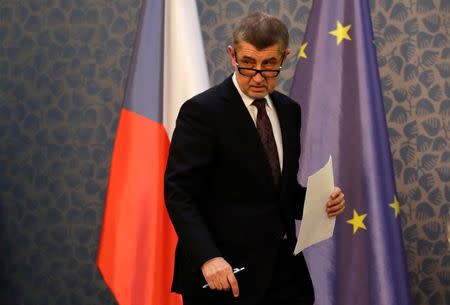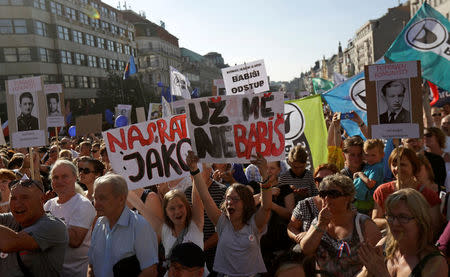Anti-establishment Czech premier to be reappointed before coalition sealed
PRAGUE (Reuters) - The Czech president will re-appoint Andrej Babis as prime minister on Wednesday as he tries to end a long political stalemate by forming a coalition backed by the anti-NATO Communists for the first time since the 1989 Velvet Revolution.
Babis, whose appointment for a second time by President Milos Zeman has brought Czechs out onto the streets in protest, has ruled as a caretaker since January when the minority government of his anti-establishment ANO party lost a parliamentary confidence vote.
His efforts to form a coalition have struggled with other parties reluctant to support the billionaire businessman who is under police investigation over criminal charges. While Babis denies the charges, this has led to the Czech Republic's longest period without a fully-fledged government.
Babis is now finalising a government deal with the Social Democrats but this is subject to a vote by members of the centre-left party which is expected to be declared on June 15.
President Zeman will reappoint Babis, who won elections last October, at 2 pm (noon GMT) even though the coalition deal has yet to be confirmed in the hope of ending the deadlock.
"Andrej Babis ... has the right and also the duty, as an election winner, to negotiate the government," Zeman told Czech TV last week. "I will do this to speed up the process."
Babis was first appointed prime minister in late 2017 after ANO won three times as many votes as its closest rival in October on promises to clean up corruption, boost road spending and cut taxes while standing up to Brussels and its migration policies.
But he is fighting allegations he illegally gained European Union subsidies meant for small businesses a decade ago. He denies wrongdoing, describing the charges as a political ploy.
Even a coalition with the Social Democrats would be a minority government, holding 93 of the lower house's 200 seats. It would therefore need parliamentary backing from the far-left Communists - the first time they would be able to influence national policy since their fall almost 30 years ago.
On Tuesday, thousands demonstrated in Prague and dozens of other Czech cities against the prospect of Babis ruling again while under investigation as well as his courting of the Communists.
The protests have echoed some voters' unease over alleged creeping backsliding on democracy elsewhere in eastern EU member states.
"A BAD PRIME MINISTER"
Some senior Social Democrats are unhappy about allying with Babis. "He is a bad prime minister," said Lubomir Zaoralek who served as foreign minister in an earlier government when Babis held the finance portfolio. "It is a mistake to think that what worked for him in business will succeed in government too," he told the Mlada Fronta Dnes newspaper in May.
However, Czech media have reported unofficial results from district parties that have already voted suggest members are opting for the coalition.
Czechs are watching for signs of whether the Communists can influence foreign policy in return for supporting the coalition in parliament. However, Babis pushed through a mandate last week increasing Czech army deployments in the coming years, including to the Baltic states, which the Communist Party strongly opposed.
Babis has said that his second government should seek a confidence vote in parliament as early as July 11, although Wednesday's appointment sets no official deadline.
ANO has led polls since first entering a Social Democrat-led government in 2014. It held 29 percent support in a CVVM institute survey release on Monday. The Social Democrats rose to second place with 13 percent.
($1 = 21.9200 Czech crowns)
(Reporting by Robert Muller and Jason Hovet; editing by David Stamp)




